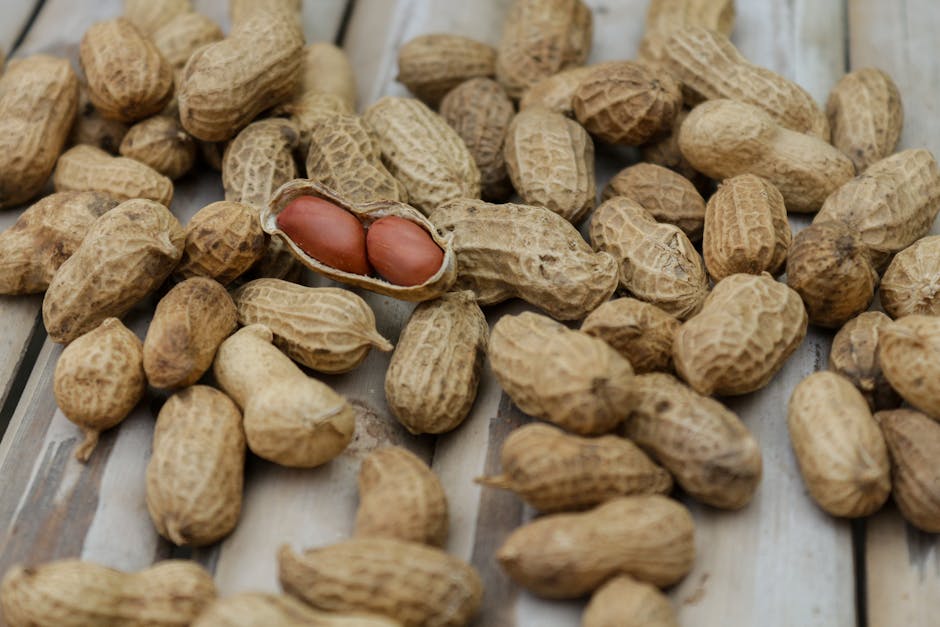Losing weight can be a challenging endeavor for anyone, but it can be even more difficult for people with food allergies. Navigating dietary restrictions while aiming for a healthy weight can feel overwhelming. However, with careful planning and smart strategies, it’s possible to achieve sustainable weight loss without compromising your health or well-being.
This article provides practical and safe weight loss tips tailored specifically for individuals with food allergies. We’ll delve into the importance of identifying trigger foods and understanding their nutritional replacements, emphasizing the role of balanced meals and mindful eating. You’ll discover strategies to avoid common pitfalls associated with restrictive diets and learn how to create a personalized weight loss plan that works for your unique needs and limitations.
The article is structured to guide you through the process step-by-step. First, we’ll discuss the importance of consulting with a registered dietitian and allergist to create a safe and effective weight loss plan. Next, we’ll explore essential nutrition tips, including strategies for incorporating nutrient-rich foods and managing cravings.
Finally, we’ll discuss practical tips for meal preparation, incorporating physical activity, and maintaining motivation throughout your weight loss journey.
Safe and Effective Weight Loss

Navigating weight loss with food allergies can feel like a tightrope walk. You want to shed pounds but need to avoid triggering ingredients. Fear not!
There are safe and effective strategies that can help you reach your goals without compromising your health.
First, focus on nutrient-dense foods that align with your allergy restrictions. This means prioritizing fruits, vegetables, lean protein sources, and whole grains. For example, if you’re allergic to dairy, explore plant-based milk alternatives like almond or soy milk.
Next, embrace mindful eating. This involves paying attention to your hunger and fullness cues, savoring each bite, and avoiding distractions while eating. Mindful eating helps you better understand your body’s signals and avoid overeating.
Don’t underestimate the power of regular physical activity. Aim for at least 150 minutes of moderate-intensity exercise or 75 minutes of vigorous-intensity exercise per week. Exercise not only burns calories but also boosts metabolism and improves overall well-being.
While restrictive diets can be tempting, they often lead to nutrient deficiencies and rebound weight gain. Instead, focus on sustainable lifestyle changes. Embrace a balanced diet rich in diverse foods, prioritize regular exercise, and engage in stress-reducing activities.
Finally, consult a registered dietitian or allergist specializing in food allergies. They can provide personalized guidance, help you create a safe and effective meal plan, and address any specific concerns you may have. Remember, weight loss is a journey, and finding the right strategies for your individual needs is crucial for success.
Allergy-Friendly Diet Strategies

Navigating weight loss with food allergies can feel like a tightrope walk. You need to shed pounds while avoiding your triggers, a delicate balance. But fear not, there are strategies to make this journey smoother!
First, know your triggers. This sounds obvious, but a clear understanding of your allergies, including cross-contamination risks, is crucial. This knowledge forms the foundation for your diet plan.
Next, consult a registered dietitian. A qualified professional can help create a personalized meal plan that’s both allergy-friendly and nutritionally balanced for weight loss. They can also guide you on safe substitutions for common allergens.
Speaking of substitutions, explore alternative ingredients. Rice flour, almond flour, coconut flour, and quinoa flour can replace wheat, while soy milk, almond milk, and oat milk are fantastic dairy alternatives. Experimenting with spices and herbs can also add flavor and excitement to your dishes.
Remember, portion control is key. Even with healthy, allergy-friendly foods, overeating can hinder your weight loss progress. Focus on mindful eating, savoring each bite, and listening to your body’s fullness cues.
Lastly, don’t skip meals. This can lead to overeating later, impacting your weight loss journey. Opt for small, frequent meals to keep your metabolism humming and energy levels stable.
Remember, consistency is the key. Be patient with yourself and celebrate every small victory. With proper planning and a positive mindset, you can achieve your weight loss goals while living a fulfilling life free from allergies.
Food Swaps for Fast Results

Navigating weight loss with food allergies can feel like a tightrope walk, but with the right knowledge and approach, it’s achievable. The key is understanding how to make strategic swaps that fuel your body while respecting your dietary restrictions. Here are some tips to kickstart your journey:
Embrace Protein Power: Protein is your weight loss superhero! It keeps you feeling fuller for longer, boosting satiety and preventing those dreaded cravings. Swap out refined carbs like white bread and pasta for protein-rich options like quinoa, lentils, chickpeas, or lean meats and fish.
These swaps not only support healthy weight management but also offer essential nutrients your body needs.
Get Creative With Fat: Don’t shy away from healthy fats! They play a crucial role in keeping you satisfied and supporting hormone balance. Opt for olive oil, avocado, nuts, and seeds instead of processed fats found in many packaged snacks and desserts.
These swaps provide sustained energy and contribute to a balanced diet.
Fiber Up: Fiber is another essential nutrient that helps you feel fuller, improves digestion, and regulates blood sugar levels. Incorporate fiber-rich fruits and vegetables into your diet – think berries, apples, broccoli, and spinach. These swaps are naturally low in calories, providing bulk to your meals without overdoing it.
Mindful Snacking: Snacking can be a minefield when you have allergies, but it doesn’t have to be off-limits. Choose allergy-friendly options like fruits, veggies, nuts, and seeds. These natural snacks provide essential nutrients and keep you from reaching for processed or sugary treats.
Prioritize Whole Foods: The cornerstone of a healthy weight loss journey lies in whole, unprocessed foods. Avoid sugary drinks, processed snacks, and fast food. Stick to natural ingredients that provide essential nutrients and minimize hidden allergens.
This approach promotes both weight loss and overall well-being.
Remember, patience and consistency are key! Weight loss takes time and effort, especially when managing allergies. Be kind to yourself, celebrate small victories, and stay focused on the long-term goal. With dedication and the right approach, you can achieve your weight loss goals while managing your food allergies.
Prioritize Nutrient-Dense Foods

When you’re limited by food allergies, it’s tempting to feel restricted in your choices, especially when it comes to weight loss. But the key is to focus on nutrient-dense foods, meaning foods packed with vitamins, minerals, and fiber in a relatively low-calorie package. This strategy not only helps you shed pounds but also supports your overall health and well-being.
Think of it this way: instead of focusing on what you can’t eat, shift your mindset to what you can enjoy. Explore the vast world of fruits, vegetables, lean proteins, and whole grains that are both allergy-friendly and incredibly nutritious. These foods will keep you feeling full and satisfied, preventing those cravings that can derail your weight loss journey.
Here are some specific examples of nutrient-dense foods that are often allergy-friendly:
- Fruits: Apples, pears, berries, bananas, grapes, melons, kiwis, and citrus fruits are all generally safe options.
- Vegetables: Broccoli, cauliflower, spinach, kale, carrots, bell peppers, cucumbers, and zucchini offer a vibrant rainbow of nutrients.
- Lean proteins: Chicken, turkey, fish, tofu, tempeh, and beans are excellent sources of protein and can be prepared in countless ways.
- Whole grains: Quinoa, brown rice, oats, and buckwheat are allergy-friendly alternatives to refined grains and can be used in various recipes.
Remember, consulting a registered dietitian or a certified allergy specialist is crucial. They can help you create a personalized meal plan that aligns with your specific needs and allergies, ensuring you get the nutrients you require for sustainable weight loss.
Maximize Calorie Burn with Exercise

While diet is crucial for weight loss, especially with food allergies, incorporating exercise is a powerful tool for maximizing calorie burn and achieving your goals. Regular physical activity boosts your metabolism, helping you torch more calories even at rest. It also builds lean muscle mass, which further increases your metabolic rate.
This means you can enjoy a more sustainable weight loss journey, even with limited food options.
The best types of exercise for people with food allergies are those that are enjoyable and sustainable. Find activities that you genuinely like, whether it’s dancing, swimming, cycling, hiking, or joining a fitness class. Variety is key, as it keeps your body guessing and prevents plateaus.
Remember, even moderate-intensity exercise like brisk walking can make a significant difference in your weight loss journey.
Always consult your doctor before starting a new exercise program, especially if you have any underlying health conditions or allergies that could affect your workout. Listen to your body, and don’t push yourself beyond your limits. If you experience any discomfort or pain, stop and rest.
Gradually increase the intensity and duration of your workouts as you build strength and endurance.
Remember, exercise isn’t just about shedding pounds; it’s also about improving your overall health and well-being. Regular physical activity reduces stress, improves sleep quality, and boosts your mood. So, embrace the power of movement and enjoy the many benefits it has to offer!
Mindful Eating for Sustainable Results

Mindful eating is a powerful tool for sustainable weight loss, especially for those with food allergies. It involves paying close attention to your food choices, hunger cues, and eating habits. By practicing mindful eating, you can learn to savor your meals, eat only when truly hungry, and avoid overeating.
This approach can help you make healthier choices that align with your dietary restrictions while fostering a positive relationship with food.
Start by tuning into your hunger and fullness cues. Before you eat, ask yourself: “Am I truly hungry, or am I bored, stressed, or just craving something?” If you’re unsure, wait 15 minutes and see if the hunger persists. This pause can often prevent mindless eating and overconsumption.
Similarly, pay attention to your body’s fullness signals during and after meals. Stop eating when you feel comfortably satisfied, not overly full. This allows you to enjoy your food and prevent overeating.
Another crucial aspect of mindful eating is focusing on the present moment. Put away distractions like TV, phones, and work, and simply savor each bite. Notice the flavors, textures, aromas, and even the appearance of your food.
This heightened awareness can help you appreciate your meals more and potentially consume less.
Mindful eating also involves being conscious of your environment. Choose a calm and peaceful setting for your meals. Opt for smaller plates to reduce portion sizes, and take time to chew your food thoroughly.
These simple actions can make a significant difference in your eating habits and overall weight management.
Remember, mindful eating is not about deprivation or restriction. It’s about building a healthy and sustainable relationship with food. By being mindful, you can learn to enjoy your food while making healthy choices that meet your dietary needs and support your weight loss goals.
Conclusion
Navigating weight loss with food allergies can feel overwhelming, but it’s achievable with the right approach. This article outlined a path to safe and effective weight loss, focusing on allergy-friendly strategies and practical tips. Remember, focusing on nutrient-dense foods, replacing unhealthy choices with allergy-safe alternatives, and incorporating exercise can help accelerate your progress.
Mindful eating, a key element of sustainable weight loss, can help you avoid emotional triggers and overeating. While quick fixes may be tempting, prioritizing a balanced, allergy-friendly diet and consistent exercise is essential for long-term success.
Don’t hesitate to consult a registered dietitian or allergist to personalize your journey.
Embrace the knowledge and tools presented in this article, and take control of your health and well-being. You can achieve your weight goals while managing food allergies with a little effort and dedication.
